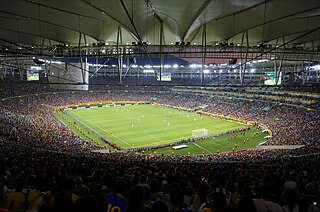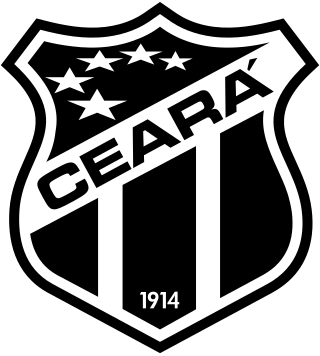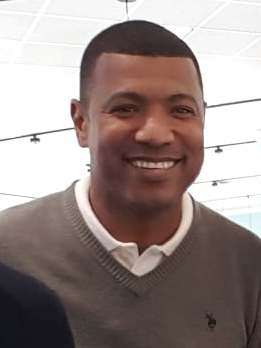Related Research Articles

Sport Club Corinthians Paulista is a Brazilian professional sports club based in São Paulo, in the district of Tatuapé. Although it competes in multiple sports modalities, it is best known for its professional men's football team, which plays in the Campeonato Brasileiro Série A, the top tier of Brazilian football, as well as in the Campeonato Paulista Série A1, the first division of the traditional in-state competition.

São Paulo Futebol Clube is a professional football club in the Morumbi district of São Paulo, Brazil. It plays in Campeonato Paulista, São Paulo's premier state league and Campeonato Brasileiro Série A, the top tier of Brazilian football. Despite being primarily a football club, São Paulo competes in a wide variety of sports. Its home ground is the multipurpose 72,039-seater MorumBIS Stadium, the biggest private-owned field in Brazil. São Paulo is Brazil’s biggest worldwide champion and also one of the only two clubs that have never been relegated from the top division, the other being Flamengo.

Esporte Clube Vitória is a Brazilian professional club based in Salvador, Bahia founded on 13 May 1899. It competes in the Campeonato Brasileiro Série A, as well as in the Campeonato Baiano, the top flight of the Bahia state football league.

Esporte Clube Bahia is a Brazilian professional football club, based in Salvador, capital city of the Brazilian state of Bahia. The club competes in the Campeonato Baiano, Bahia's state league, and the Campeonato Brasileiro Série A, highest division of Brazilian football league system.

Football is the most popular sport in Brazil and a prominent part of the country's national identity. The Brazil national football team has won the FIFA World Cup five times, the most of any team, in 1958, 1962, 1970, 1994 and 2002. Brazil and Germany are the only teams to succeed in qualifying for all the World Cups for which they entered the qualifiers; Brazil is the only team to participate in every World Cup competition ever held. Brazil has also won an Olympic gold medal, at the 2016 Summer Olympics held in Rio de Janeiro and at the 2020 Summer Olympics in Tokyo.
The Torneio Roberto Gomes Pedrosa, also known as Taça de Prata, or nicknamed Robertão, was an association football competition contested in Brazil between 1967 and 1970 among soccer teams from São Paulo, Rio de Janeiro, Rio Grande do Sul, Minas Gerais and Paraná states. It was an important soccer tournament, being considered a predecessor to the Brazilian Championship induced in 1971. Thus in 2010 the Brazilian Football Confederation decided to consider the winners of the Robertão as Brazilian champions. The 1st edition of the tournament was organized by Federação de Futebol do Estado do Rio de Janeiro and Federação Paulista de Futebol.

Ceará Sporting Club, or simply Ceará, is a Brazilian professional football club from the city of Fortaleza, capital city of the Brazilian state of Ceará.

Carlos César Sampaio Campos is a Brazilian football pundit and retired footballer, who played as a midfielder. He currently serves as an assistant coach of Campeonato Brasileiro Série A club Flamengo.

Raimundo Ferreira Ramos Júnior, known as Júnior or Júnior Baiano as he comes from the state of Bahia, is a former Brazilian professional footballer who played as a centre-back.
Edílson da Silva Ferreira is a Brazilian football pundit and retired footballer who played as a forward.
Paulo Sérgio Rosa, usually known as Viola, is a former Brazilian footballer who played as a forward. He was given his nickname in his youth, which was a reference to the brand–name of his first pair of football boots.

The Campeonato Brasileiro Série A, commonly referred to as the Brasileirão, the Série A or the Brazilian Série A, is a Brazilian professional league for men's football clubs. At the top of the Brazilian football league system, it is the country's primary football competition. Contested by 20 clubs, it operates on a system of promotion and relegation with the Campeonato Brasileiro Série B. In 2021, the competition was chosen by the IFFHS as the strongest national league in South America as well as the strongest in the world.

Miraildes Maciel Mota, commonly known as Formiga, is a Brazilian former footballer who played as a midfielder. She previously played for professional clubs in Sweden, the United States and France. Formiga holds many international records as a member of the Brazil national team, being the only player present in all Olympic Games tournaments of women's football since the first edition at the 1996 Summer Olympics, and a record for appearing at seven different FIFA Women's World Cup tournaments.

Raimundo Nonato Tavares da Silva, commonly known by the nickname Bobô, is a retired Brazilian professional football right midfielder and head coach, who played for several Campeonato Brasileiro Série A clubs.

Manoel Tobias da Cruz Júnior, commonly known as Manoel Tobias, is a former futsal player. He is a two time futsal world champion with the Brazilian team
In Brazilian football, G-12 refers to a group of 12 clubs: Atlético Mineiro, Botafogo, Corinthians, Cruzeiro, Flamengo, Fluminense, Grêmio, Internacional, Palmeiras, Santos, São Paulo, and Vasco da Gama. They are considered the most popular and successful sides in Brazilian football, having won all but six editions of the Brasileirão between them since the tournament's inception.

Sport Club Corinthians Paulista, commonly known as Corinthians, is a professional women's association football club based in São Paulo, Brazil. Founded in 1997, the team is affiliated with Federação Paulista de Futebol and play their home games at Estádio Parque São Jorge. The team colors, reflected in their logo and uniform, are white and black. They play in the top tier of women's football in Brazil, the Campeonato Brasileiro de Futebol Feminino, and in the Campeonato Paulista de Futebol Feminino, the first division of the traditional in-state competition.

Club de Regatas Vasco da Gama, commonly known as Vasco da Gama or simply Vasco, is a women's association football club based in Rio de Janeiro, Brazil. Founded in 1987, the team has been inactive for periods prior to its most recent reinstatement in 2016. The team is affiliated with Federação de Futebol do Estado do Rio de Janeiro and play their home games at São Januário. The team colors, reflected in their logo and uniform, are white and black. They play in the third tier of women's football in Brazil, the Campeonato Brasileiro de Futebol Feminino Série A3, and in the Campeonato Carioca de Futebol Feminino, the traditional in-state competition.
Paulo Sérgio Lira Goés, simply known as Fininho, is a Brazilian retired professional futsal player who played as a winger, and a futsal manager.
References
- ↑ Mendonça, Renata (24 November 2021). "Formiga, a última dança: 26 anos de seleção, 233 jogos e um legado imensurável" (in Brazilian Portuguese). Dibradoras. Retrieved 15 January 2023.
- ↑ Enny Vieira, Moraes (4 June 2012). "As mulheres também são boas de bola: histórias de vida de jogadoras Baianas (1970 - 1990)" [Women are also good with the ball: life stories of female players from Bahia (1970 - 1990)]. Pontifical Catholic University of São Paulo . Retrieved 15 January 2023.
- ↑ "Brazil - List of Women's Champions". RSSSF Brasil. Archived from the original on 7 June 2021. Retrieved 9 March 2022.
- ↑ Garin, Erik; Pierrend, José Luis (28 January 2001). "South-American Women's Championship 1995". Rec.Sport.Soccer Statistics Foundation . Retrieved 29 April 2013.
